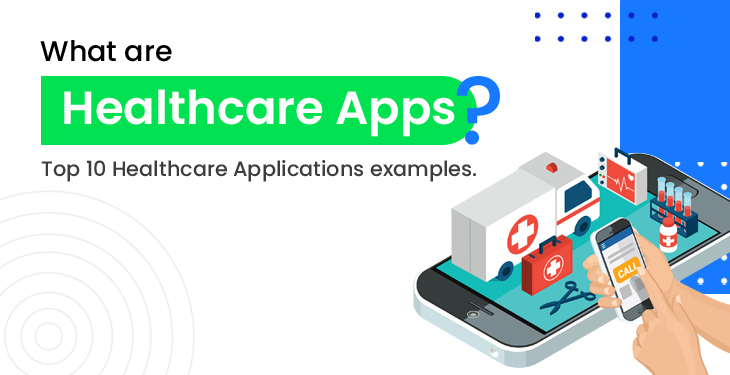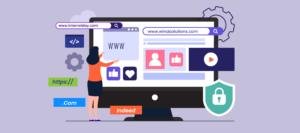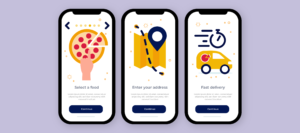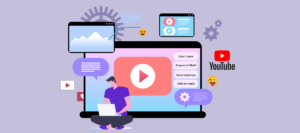The use of mobile apps in the medical technology and healthcare industries has increased dramatically over the last several years. By 2025, the industry for mobile health is predicted to be worth $185 billion worldwide. Additionally, as customers switch from offline to digital channels for their healthcare needs, the digitization of healthcare is accelerating.
Today, customers expect mobile applications that can track their heart rate, oxygen levels, and step counts to see how their health is performing. Additionally, mobile healthcare apps are growing to link patients with healthcare providers and offer practical healthcare outcomes.
Most importantly, healthcare applications are making hospital patient management simpler. The constant stream of patients makes it challenging for hospitals to run their businesses. So, today more than ever, healthcare software solutions that improve the efficiency of healthcare institutions’ workflow are quite helpful.
Which of the many accessible apps can you use for your wellness requirements? Here are the top options among the greatest healthcare applications examples on the market.
What are Healthcare Apps?
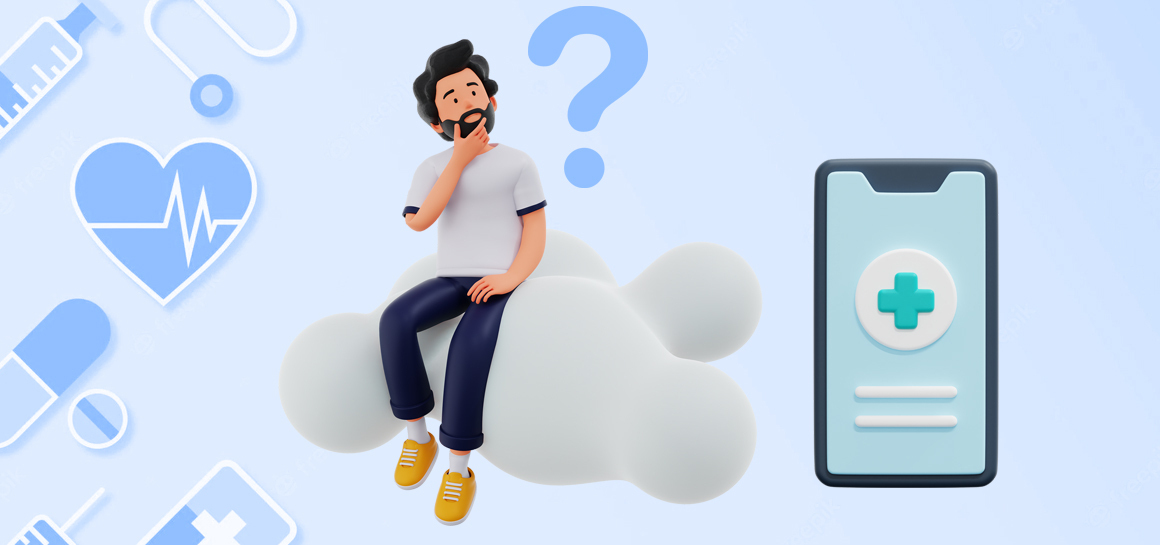
Apps for health and well-being are included in the healthcare category. Despite how much they resemble one another, they also differ greatly.
- The FDA defines a health app as mobile software that detects, monitors, or treats illness.
- A wellness app is a mobile software that improves or monitors a user’s health. These apps can target aspects of general health that are psychological, physiological, social, environmental, or even spiritual.
Although many applications are in the “health” category, not all are regarded as “healthcare” apps. Yoga classes, for instance, may be very helpful in assisting you in reaching your fitness objectives, but they need to integrate with your continuing, physician-led treatment schedule.
In this article, we’ll concentrate on Healthcare Applications examples that you can use in addition to your provider-based healthcare routine. Some of them even operate as a platform for virtual visits. They enable health tracking and reporting, medical reminders, and communication with your provider.
Benefits of Healthcare Apps
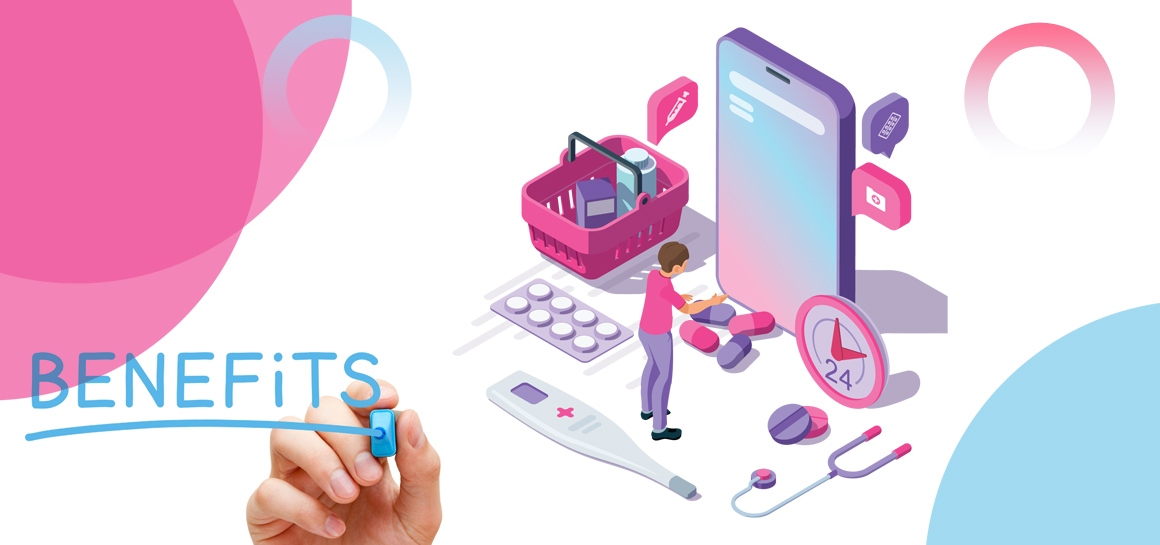
As you may already be aware, the creation of mobile healthcare apps is now essential for healthcare providers to fulfill the constantly changing needs of their patients and remain competitive. Patients will be more loyal to providers who work with digital specialists to strategically develop and create high-quality mobile experiences, increasing income both now and in the future.
Digital health trends show that patients use their smartphones more frequently than ever to track their overall health, get health advice, and have video calls with doctors for prescriptions. People love the absolute ease that healthcare apps offer. With the advancements in mobile healthcare technology, people may obtain personalized care immediately, save money, and exert more control over their health.
We seem to have the entire world at our fingertips in the digital age. We have unending access to data and information. Patients with chronic disorders, including diabetes, obesity, and heart disease, can benefit from the information provided through mobile app development for healthcare apps that improve their quality of life. Patients and doctors can more effectively identify therapies due to access to applications that track their daily stats and development. This is only one advantage among many that these apps offer to users and healthcare professionals.
Top Healthcare Application Examples
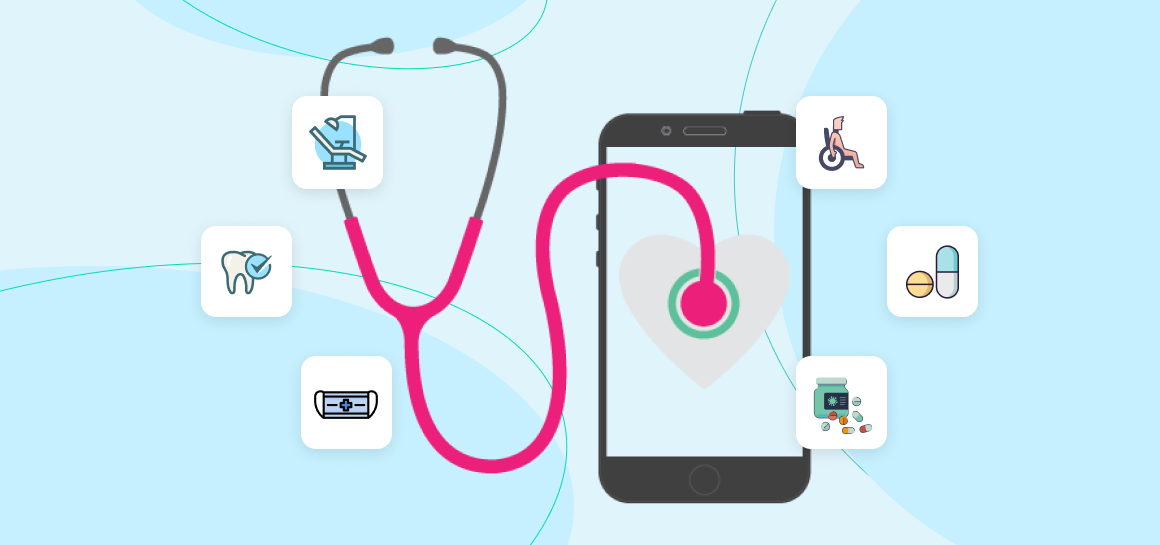
With so many apps available, it can be challenging to distinguish the interesting ones from the rest. However, the top Healthcare Applications examples on our list have proven themselves over time and have solid reputations backed by hundreds, often thousands, of favorable user reviews. Let’s dive in!
1. Generis: DNA & Nutrition:
Generis is one of the top healthcare apps that helps individuals live better lives by knowing their genes. Users adore this revolutionary app because of its user-friendly layout and gorgeous design. Generis assures
- DNA-based counsel
- Fitness advice
- Nutrition & food
- Supplements
And a lot more…
With the help of safe and practical measures; this healthcare app helps users become the best versions of themselves by understanding them through their genetic structure. Generis can retrieve DNA information from Ancestry.com and 23 and ME. Users of their apps will continue to get recommendations based on their goals and lifestyle.
Are you curious why DNA matters?
According to Generis, certain bodies burn various forms of energy more effectively than others. The program developed a formula to produce the most accurate personalized recommendations for users to avoid the trial and error method.
2. EyeCare Live
One of the best Healthcare Applications examples apps, EyeCare Live, enables people to consult an eye doctor whenever and wherever they want using their smartphones. With this software, users may monitor the progression of eye illnesses and maintain good eye health. Patients with dry eyes, red eyes, allergic eyes, or inquiries concerning contact lenses benefit from it the most.
Instead of using unidentified doctors, the medical app connects you with your eye doctor, who is familiar with your medical background.
How does it operate?
- By taking photos or videos, the patient documents their eye health.
- With high-definition video, the doctor diagnoses and fixes the issue.
EyeCare Live visits are typically free, and the doctors will also take cash payments or your health insurance. Details can be found on the doctor’s page.
3. MyFitnessPal
One of the top health-tracking applications available for iOS and Android is MyFitnessPal. Additionally, a desktop version is accessible. It is a multipurpose tracker that may monitor activity, mindfulness, food intake, sleep, fertility, and other things. You can use the app to make food plans, set weight and activity goals, and connect it with most fitness trackers and watches.
If you pay to upgrade, you’ll get premium features like more thorough reporting, including meal macros and logs you can download or email your healthcare physician. Another element of the app is an active online community for support and guidance on weight loss.
4. MySugr – Diabetes Tracker Log
MySugr is one of the popular healthcare apps that aims to control and manage diabetes. It enables patients to rapidly connect their blood glucose monitor and keep track of their sugar and carb intake. The app states that it has been featured in Forbes, TechCrunch, and other publications and that Healthline has been recognized three times as the Top Diabetes App. This software enhances daily life by serving as a free diabetes journal where the user can
- Customise the dashboard
- Identify the insulin (With MySugr PRO)
- Check your blood sugar level in clarity.
- Enables users to communicate with doctors about reports
- Safely backup your data
Users claim this program has completely changed their lives, giving them better control over their daily tracking and safe data backup. Additionally, doctors can review data to check for people with diabetes who recover quickly. Many people have benefited from such a user-friendly program that encourages people to manage Type 1 and Type 2 diabetes.
5. Better Help – Online Counseling
This is one of the most popular Healthcare Applications examples and a pioneer in counseling technology. Online professionals such as qualified therapists, counselors, and medical specialists are more quickly and easily accessible to patients through Better Help. Patients adore the individualized approach of this app and the personal care provided via video chat, SMS, etc., according to over 14,000 reviews.
Patients who are satisfied with their online treatment sessions, as opposed to traditional in-person sessions, submit the reviews. A safe online therapy environment is made possible by this life-altering experience. One of the top medical applications for patients, Better Help, has more than 3000 experienced trainers and counselors specializing in various fields, including depression and anxiety disorders, family and relationship therapy, etc. Additionally, they assist patients and the linked community through group webinar services.
6. Medici
Medici is among the top platforms while discussing the finest application platform examples of medical apps for patients in 2022.
Users may communicate with doctors quickly and affordably because of this technology. They can also describe their ailments and symptoms and upload images after speaking with doctors. After completing that, the doctor will email the patient’s pharmacist the prescription to obtain the necessary drugs and a prescription plan. So once more, it is a HIPPA-compliant tool that makes scheduling doctor appointments less complicated.
7. Heal – Physician house calls are back
Beginning in the 1930s, physician house calls were a regular practice, but their use decreased as the 20th century progressed. Heal is committed to restoring doctor home visits. As a result of the COVID pandemic, Heal offers patients comfort by enabling them to stay away from doctor’s offices and urgent care centers where they can be exposed to dangerous viruses. Heal is quickly rising to the top as one of the top healthcare applications examples of 2022, with over 3k favorable evaluations.
With Heal, patients recognize that in-home visits allow doctors to observe their environment and general lifestyle to understand what might be influencing their health. Doctors may offer their patients better care and advice due to this holistic perspective.
8. Medical ID
What if you are experiencing a medical emergency and someone discovers you and your phone, but you cannot express the nature of your illness? An Android app called Medical ID allows you to create multiple medical profiles to store on your phone and has an optional premium option.
These may be quickly accessed from your home screen and give the viewer access to your most crucial medical information, such as medical contacts, blood type, and allergies. Before treating you, medical personnel or emergency personnel can quickly assess the situation. Even after you close the mobile health app, your emergency contacts will still receive your GPS location.
9. Apple Health
The built-in health tracker and iOS health “brain” app on all Apple devices is called Apple Health. It monitors your eating, activity, symptoms, heart rate, and breathing. The app can provide in-depth reports on wellness areas and easily combines with over 1,000 other apps.
Apple Health partners with participating medical facilities to keep your lab results and medical records accessible at all times. It also includes a Medical ID profile for usage in emergencies. The app allows medical donors to identify themselves and express their preferences. This is an absolute necessity if you own an Apple Watch.
10. Talkspace
For those battling anxiety, depression, eating disorders, PTSD, or finding it difficult to handle life’s obstacles, Talkspace is a group health smartphone app. There is this online therapy platform for those who don’t have the time for in-person therapy. For individuals or couples facing various life issues, Talkspace offers private sessions with over 2000 professional therapists and psychiatrists.
Users can communicate daily with therapists via texts, videos, and voice messages. Additionally, the app offers a “Live session feature” in premium packages so that users can communicate with therapists whenever and wherever they choose. Depending on the patient’s mental state, the app also discusses which psychiatrist may prescribe the medicine.
If you’re an android user looking for treatments for mental health difficulties, then Talkspace is at the top of medical apps for Android with licensed therapists in the US.
Conclusion
The demand for healthcare software development is rising as institutions embrace technology to satisfy patient needs. A healthcare application development company creates innovative, engaging digital health apps for patients and professionals. These ten apps illustrate mobile healthcare technology that helps users and facilities provide better healthcare.
Nevertheless, these healthcare applications examples have improved many people’s lives and will keep doing so.

